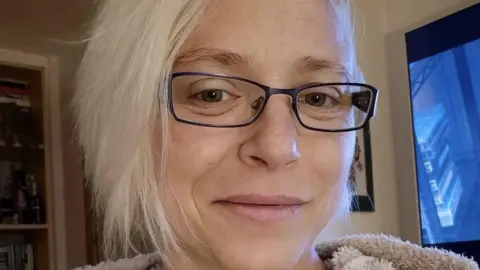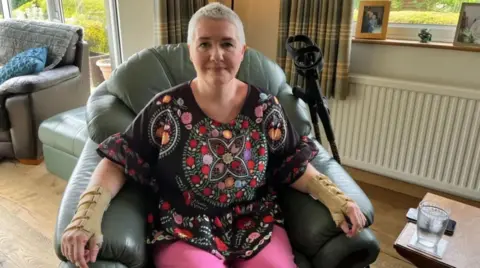'I'm always in pain - even talking hurts'
 Nia McGregor
Nia McGregorFor 48-year-old Nia McGregor, talking to people and even wearing clothes hurts.
She has fibromyalgia, a condition that causes extreme physical pain and tiredness, and said at her lowest she was taking 79 different tablets a day.
Ms McGregor, from Ruthin, lived with chronic pain for seven years before receiving a diagnosis and said she tried to end her life three times due to a lack of support.
Members of a new support group in Denbighshire have claimed doctors do not take patients "seriously enough", with some waiting more than 20 years for a diagnosis.
The Welsh government said it invested £8m annually into its adferiad programme which had expanded to address gaps in services for conditions such as fibromyalgia.
Warning: This article contains references that some people may find upsetting
Ms McGregor previously worked in health and safety as a scaffolding inspector and liked to travel and ride her motorbike but now every movement causes severe pain throughout her body.
She told BBC-produced Newyddion S4C: "Wearing clothes hurts, talking to people hurts. I can't work or drive a car. I just sit there."
Fibromyalgia is often triggered by an event that causes physical or psychological stress and Ms McGregor believes the trauma of having a hysterectomy after years of living with endometriosis may have caused hers years later.
"Doctors pass you around from department to department. You lose your independence, I had no-one to talk to," she said.
"I really wanted to kill myself."
 Nia McGregor
Nia McGregorDuring years of tests, scans and "all kinds of medicine" before she was diagnosed in 2014, Ms McGregor said she felt very low because doctors were unable to give her answers and "spent my life sitting on the sofa crying my eyes out".
She believes a lack of awareness among doctors is the "main problem".
"They didn't know what to do with me. At one point I had to go to the hospital as I hadn't been able to go to the toilet for 49 days," she said.
"All because of the number of tablets I was taking."
Ms McGregor, who also underwent a double mastectomy after being diagnosed with breast cancer in 2020, said she had lost her independence because of fibromyalgia and relied on her mum to take her "everywhere".
She said she was eventually given more appropriate medication and now "functions much better" by taking seven tables a day and morphine for the pain.
For her things changed after she was seen by a rheumatologist who she said "took one look at me" and told her: "I know it's not in your head."
 Nia McGregor
Nia McGregorMs McGregor is one of 200 members of the community group that was set up to support people with fibromyalgia and their families.
It was started by Kevin Jones from Ruthin after seeing his wife Pam, who has fibromyalgia, "suffer alone".
He is worried it is not taken "seriously enough" and it was "hit or miss" whether you are diagnosed in an acceptable timeframe.
Mr Jones said not enough people understood the condition but hoped the group would inspire others to set up similar ones across Wales.

Angharad Rees, who has Ehlers-Danlos syndrome and fibromyalgia, said getting a diagnosis was difficult and claimed some doctors accused her of "telling lies" about her symptoms.
She said she was in tears when a specialist told her she was not telling the truth after being sent to hospital in 2023 following a flare up.
"What they see is that you get upset and cry and then they tell you that it's definitely a mental health condition," Ms Rees said.
The 45-year-old, from Llandegla in Denbighshire, wants medical professionals to "listen more to the patient".
She said she found comfort in meeting others in similar situations at the support group.
The Welsh government said it had extended its adferiad programme, which was set up to treat long Covid, to other conditions such as fibromyalgia.
It added: "While we acknowledge more progress is needed, particularly around data collection, we remain committed to ensuring these services develop as our understanding and evidence base grows."
What is fibromyalgia?
According to the NHS, it is a long-term condition with symptoms including:
- Increased sensitivity to pain, muscle stiffness
- Difficulty getting to sleep or staying asleep
- Problems with memory and concentration
- Headaches
- Irritable bowel syndrome
- Feelings of frustration, worry or low mood
There is no cure, but there are treatments to help relieve some of the symptoms.
If you or someone you know is struggling with issues raised by this story, find support through BBC Action Line.
